The Start of Election Season
The latest protests in Argentina, a new IMF deal & $LIBRA
Welcome Avatar! Summer holidays in Argentina are definitely over, and the start of the legislative sessions was celebrated with fresh riots in front of Congress and Casa Rosada. An overview of the recent protests, the $LIBRA case and Argentina’s new IMF deal.
Pension Protests
The pension protest that was originally scheduled for yesterday would be a “boosted” mobilization with the help of barra bravas football hooligans, unions and social movements.
After 4 p.m. clashes with security forces began to occur, multiplying and spreading throughout downtown Buenos Aires. Many protesters headed toward Plaza de Mayo, and security at the Casa Rosada had to be reinforced, where the President was present.
Things went haywire when a group of hooligans wearing Chacarita Juniors and Central Ballester jerseys broke into the crowd, blocking traffic on Rivadavia Avenue near the Congress building. Federal Police, Gendarmerie, Prefecture, and City Police personnel used all available means to saturate the area and disperse the protesters: pepper spray, tear gas, rubber bullets, and water cannons were used without restraint.
The resulting scenes definitely delivered in terms of photogenic material, and unfortunately some victims as well: one photographer had to be rushed to the hospital after he was hit on the head by a teargas grenade, another retiree was pushed to the ground after she tried to hit a police officer, and multiple police officers were wounded.
Throughout the afternoon, videos circulated of a firearm lying in the middle of the square, which was left behind and kicked away by a police officer instead of being picked up. This hints at the possibility of not just the hooligans wanting to let these riots spiral out of control, but security forces as well.
Rioters later attacked the Casa Rosada using the stones commemorating those who died during the pandemic, and until late at night protestors gathered in front to protest with cacerolazos against Milei’s administration.
In total, 114 arrests were made, with a majority of them consisting of people with a long track record in the justice system. This morning, much in line with the revolving door policy that is still en vogue with most left leaning judges in Argentina, judge Karina Andrade ordered the release of all detainees, alluding to the “right to protest”.
Karina didn’t seem to care too much that these “protestors” also burned patrol cars and garbage containers, or that they attacked and even shot at police officers.
Impact and Pension Situation
Despite the fact that the opposition can already hear the sound of Milei’s helicopter departing as if this were a replay of 2001, when President De La Rua was forced to leave office after extended riots, chances are slim that this recent protest will change much in terms of the outlook for his government.
But how bad is the pension situation really? Minimal pensions in Argentina have always been very meagre, and for decades it has been impossible for any retiree who does not own his primary residence to only depend on that pension without further outside help or other sources of income.
Minimum pensions were especially devastated during the final stretches of the Alberto Fernández and Sergio Massa administration, dropping by as much as 30% in real terms in the first 11 months of 2023 amid a cash-strapped plan to win the elections. Since then, they have recovered by 9% in real terms, but are still below previous levels in terms of purchasing power.
When looking at minimum pensions historically since 2013 in terms of purchasing power for the basic food basket, it’s clear that depending on any government pension or minimum wage has been a losing battle in Argentina for a while now:
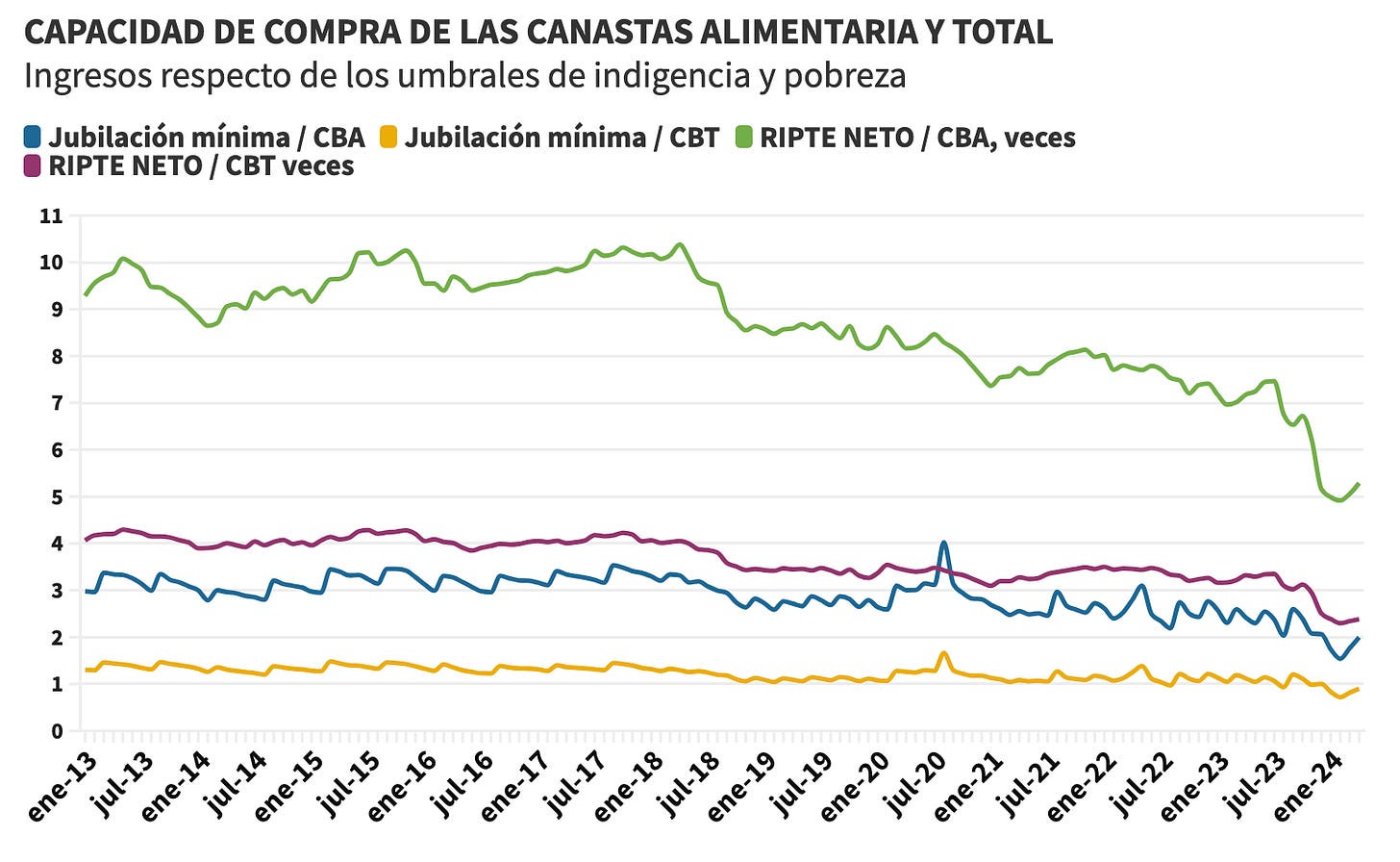
Q2 of 2024 definitely marked a low point for all indicators. More than anything this is caused by persisting inflation — although it decreased significantly, it’s still around 80% YoY. Not great if you depend on a minimum pension, which is still lower compared to other moments in recent history in terms of purchasing power.
While the protests were happening yesterday, something of more political importance was unfolding in Congress.
$LIBRA-Gate
Some more details about the $LIBRA case have come out in the meantime, and it looks like Milei’s sibling Karina Milei was responsible for the final review of the letter of intent with Cube Exchange before it was submitted to Milei for his signature.
She assumed this role with the support of three well-known associates—Mauricio Novelli, Terrones Godoy, and Sergio Morales. The official visitation records confirm multiple meetings between Karina and these the local “crypto gurus”, Hayden Davis, and Bartosz Lipinsk, Cube Exchange’s CEO.
Autist note - For more details around the $LIBRA launch, these two articles go over the pump and dump in depth:
In Congress, the opposition had already managed to summon the committees to rule on the various bills to determine responsibility and demand explanations from the President and his officials for the $LIBRA crypto scam, the cryptocurrency that Javier Milei “shared” on his social media accounts. It looks like an investigative committee will be assigned in the near future.
The Kirchnerist party also submitted a request to the Impeachment Committee to review the admissibility of the proceedings to impeach President Milei, but that vote resulted in 104 affirmative votes and 128 negative votes, which prevented the initiative from moving forward.
When the summons to regularize the Impeachment Commission, key to the future of these cases, was about to be discussed, a group of representatives from La Libertad Avanza attacked members of the MID and Representative Marcela Pagano—who is still a member of the ruling party—to prevent them from providing a quorum. If a quorum was reached, it would also put Milei’s extraordinary powers up for discussion.
The deputy brawl ended with physical blows between representatives Almirón and Zago, two allies to this day.
This whole episode had another unexpected aftershock: when several representatives stood up to demand order from the Speaker of the House, the quorum was interrupted, and Martín Menem ended the session, sparking the ire of the Kirchnerist faction. The man born with a golden spoon, Máximo Kirchner, rushed to Menem’s seat to try and force him to resume the session.
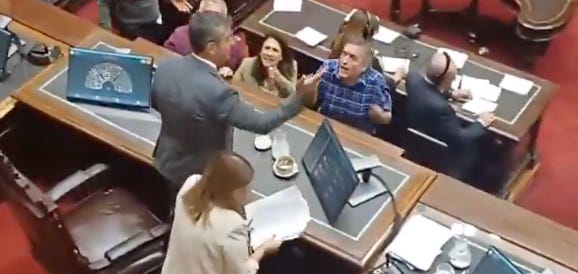
Menem’s decision to end the session came at the right time, since the Kirchnerists were about to vote on requesting that the Constitutional Affairs Committee withdraw the powers delegated to President Javier Milei.
We will see how this story continues, and undoubtedly some suitcases will have to be handed out to get things back on track, or to let things spiral in the opposite direction, depending on who has the bigger suitcase.
IMF Deal
Another legislative development was the convening of the Bicameral Commission on Legislative Procedure to analyze Decree 179/2025, signed by president Milei on Monday, by which Argentina signed a new agreement with the IMF.
This is an Extended Fund Facility agreement (EFF) and not a Stand-By Agreement (SBA). It includes a disbursement—the amount of which the government did not specify but is likely in the range of $10-20 billion dollars—for the payment of principal and interest on the foreign debt and the cancellation of non-transferable Treasury bills held by the Central Bank.
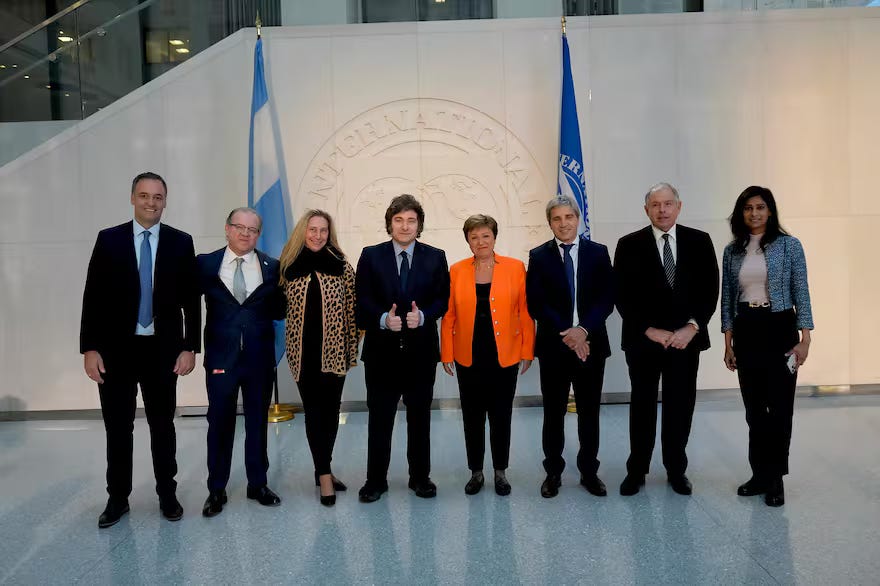
This executive order seeks to secure parliamentary support to facilitate disbursements from the IMF, with the primary objective of finally defeating inflation and ending the exchange restrictions (CEPO).
The official arguments, criticized by the opposition and many economists, focus on the fact that the new agreement would not increase Argentina's debt, given that—according to official sources—it exchanges "old debt for new debt," while simultaneously strengthening the Central Bank.
Among the arguments the opposition uses to oppose the decree's submission is the so-called "Guzmán Law," crafted by Sergio Massa’s predecessor and approved in early 2021. Article 2 of this law states that “any financing program or public credit operation carried out with the International Monetary Fund (IMF), as well as any increase in the amounts of such programs or operations, will require a law expressly approved by Congress.”
Based on this article, the opposition believes that an executive order cannot be applied in this case and that a law is needed for a new IMF deal. For the government, the decree has the force of law, so there would be no legal obstacles to moving forward.
The government's hope is that at least one of the two chambers, in this case Congress, will approve the decree to leave it in force.
Final Thoughts
The pension protest could’ve been a more genuine and legitimate protest, since pensions are still below previous levels while prices have continued to rise, if it weren’t for the fact that soccer hooligans were called up to riot.
One also has to ask the question: why was no one protesting when minimum pensions hit $80 USD/month during Massa & Fernández?
Both parties, the Milei administration and the opposition alike, are trying to milk the chaotic scenes around the riots for election clout. It was clear that the barra brava hooligans were trying to cause as much damage as possible, while planting a gun on the ground or leaving a patrol car unguarded seem to indicate that security forces were also trying to test how far protestors would go this time — and hoping they went as far as possible.
As 2025 is an election year, it is likely that these kind of scenes will intensify. Opposition parties will try to do everything within their means to show that “the people” have had enough. It is doubtful whether this will move the needle in any significant way in terms of a shift in votes: so far sentiment seems very much in favor of security forces in the Milei camp, and against Milei or authorities in general when it comes to the opposition camp. Those votes have not changed.
What has changed after yesterday’s scenes in Congress, is that the already fragile Milei team in terms of representation in both chambers will splinter up into even smaller pieces. Since Milei’s election win there have been quite a few defectors, and some representatives have left stating they are now independent — some others, like Ramiro Marra in the city of Buenos Aires, were ousted by Milei’s party.
It will be essential for La Libertad Avanza to get their ducks in a row and select capable candidates on its ballots for the October midterms to construct a more cohesive political power. So far, no official candidates have been announced.
See you in the Jungle, anon!
Other ways to get in touch:
1x1 Consultations: book a 1x1 consultation for more information about obtaining residency, citizenship or investing in Argentina here.
X/Twitter: definitely most active here, you can also find me on Instagram but I hardly use that account.
Podcasts: You can find previous appearances on podcasts etc here.
WiFi Agency: My other (paid) blog on how to start a digital agency from A to Z.



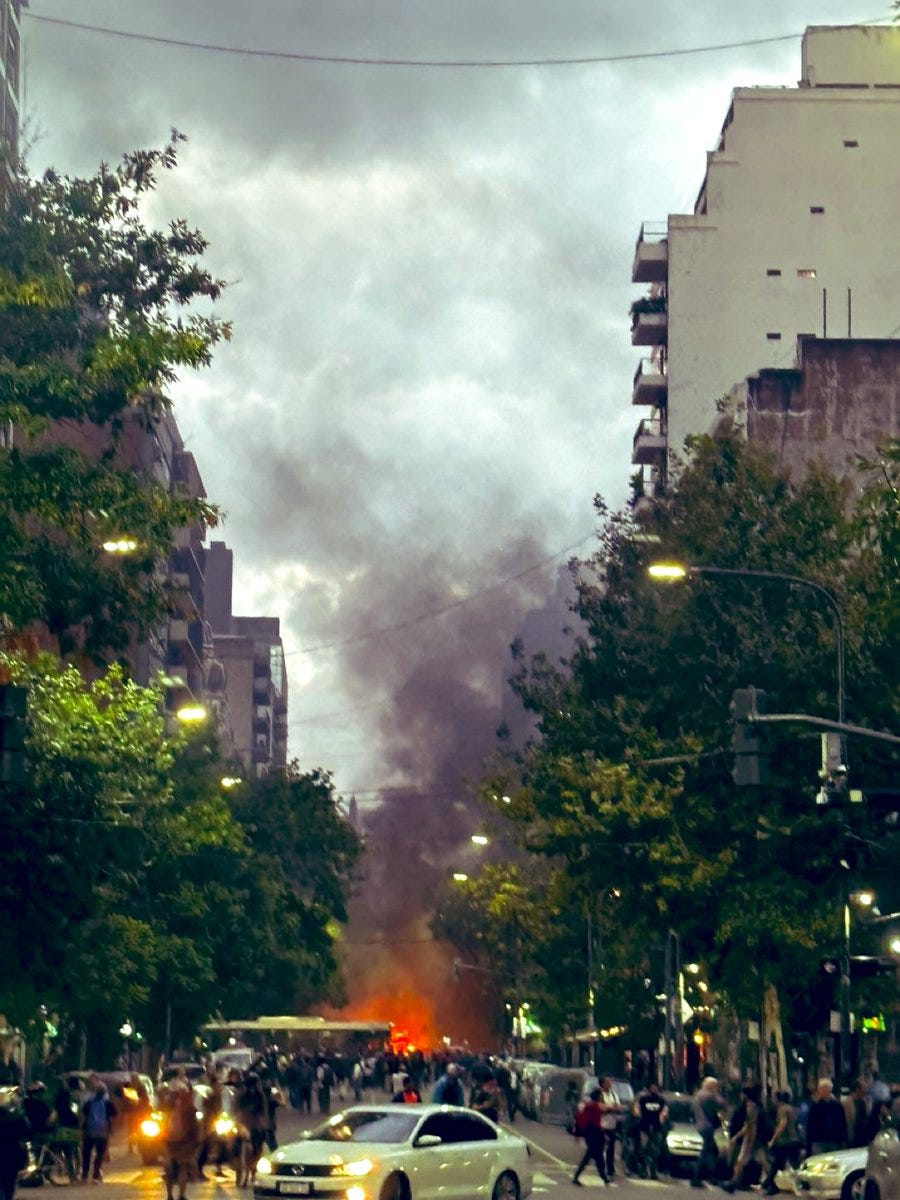
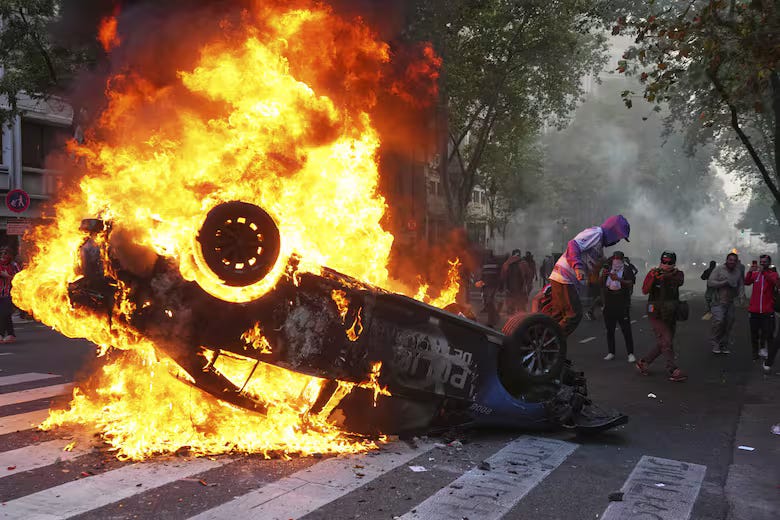

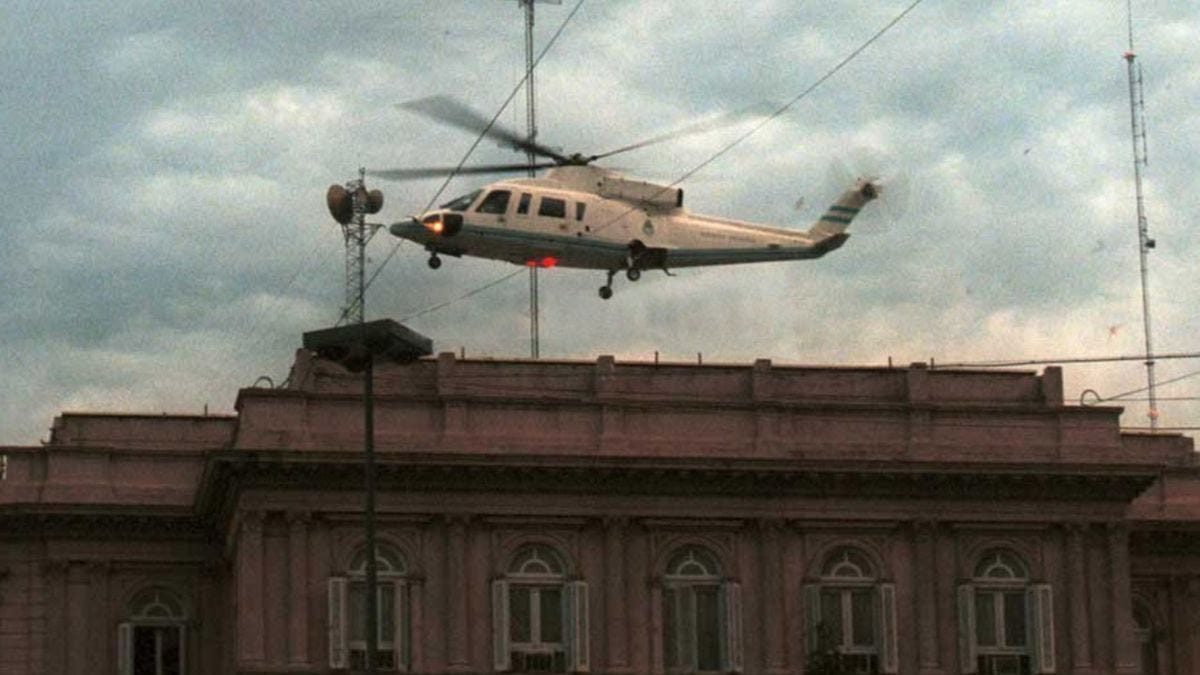
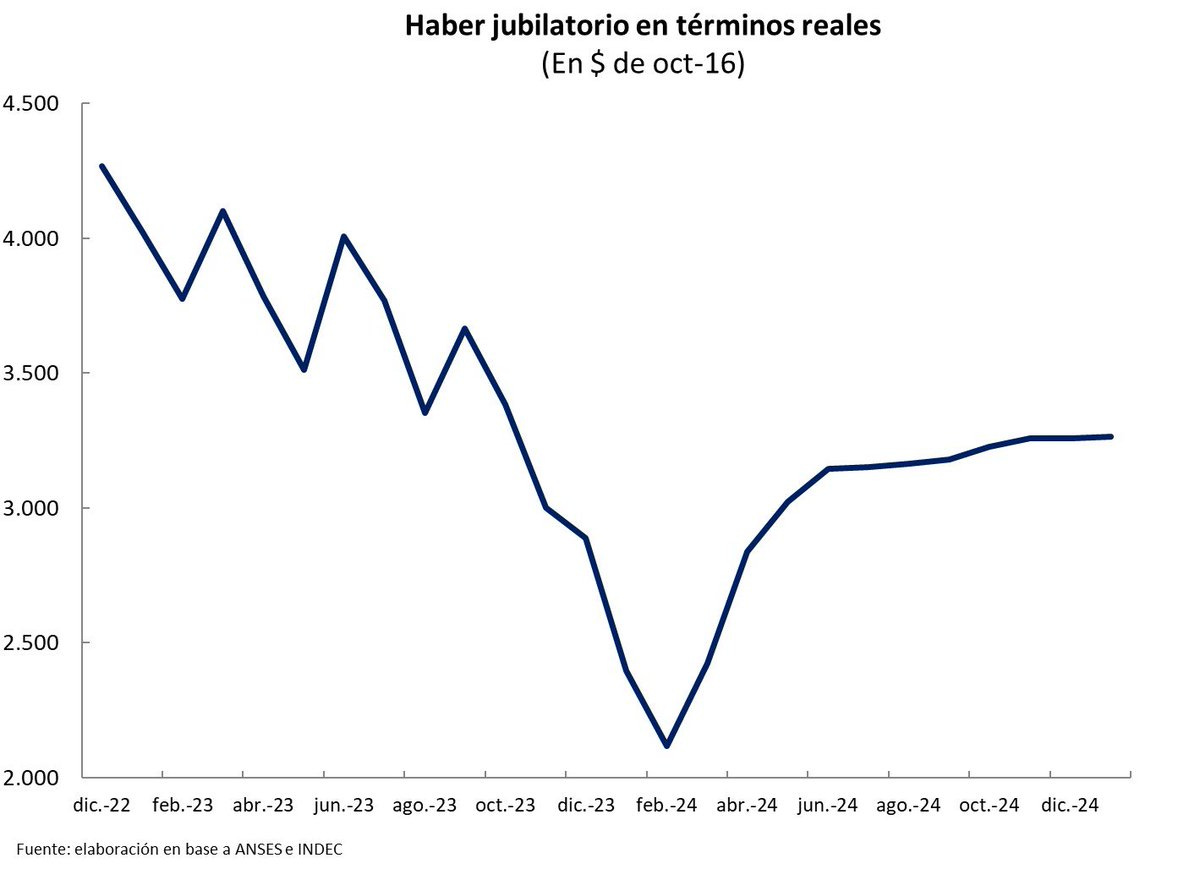


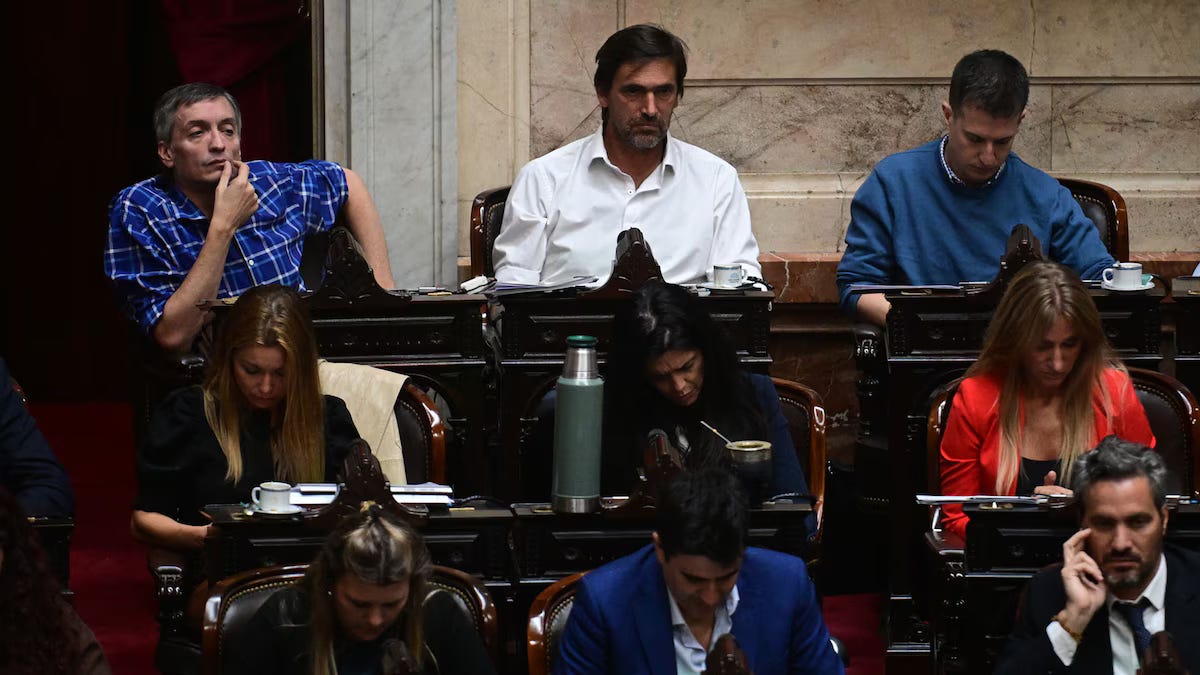


Great summary as usual Mara. I'm sure the police were just waiting for them to pick up that gun. Luckily it didn't escalate further. October can't come soon enough.